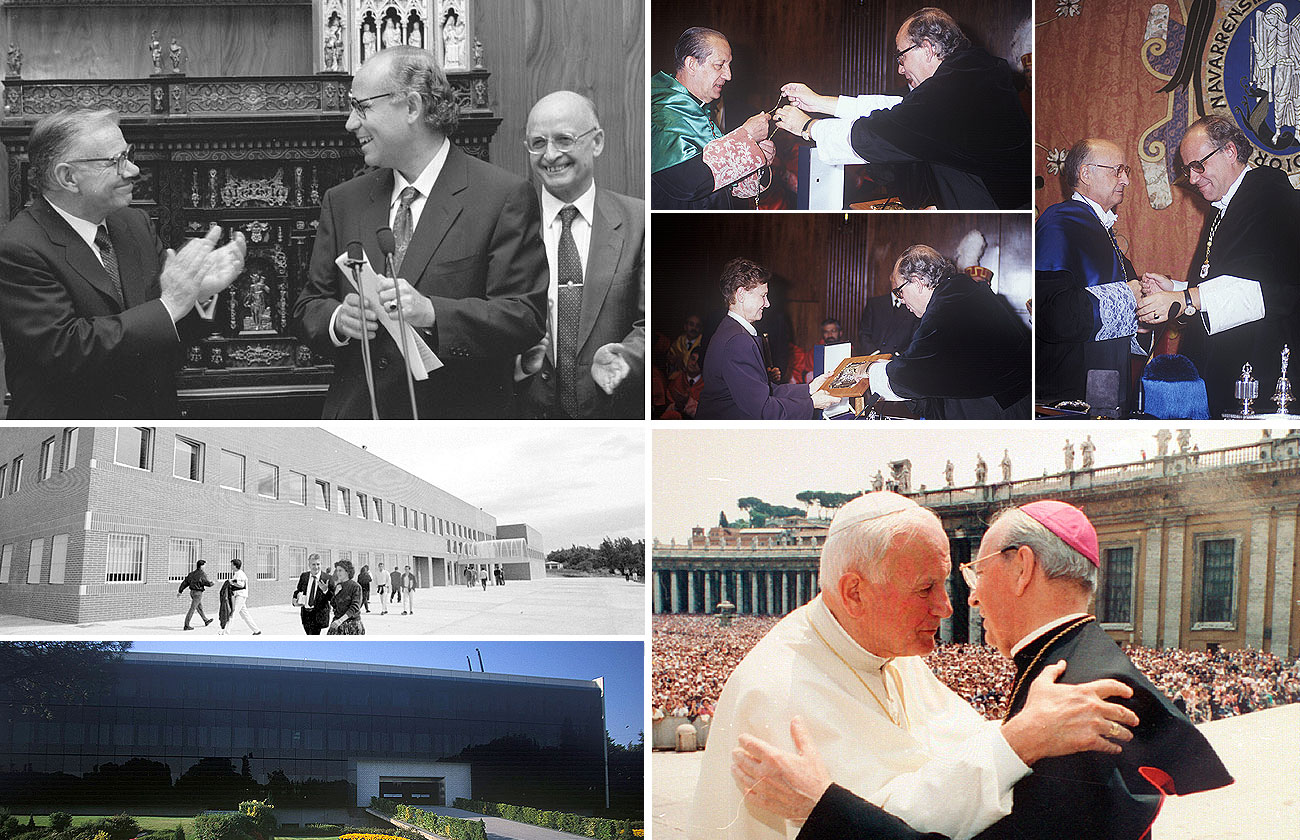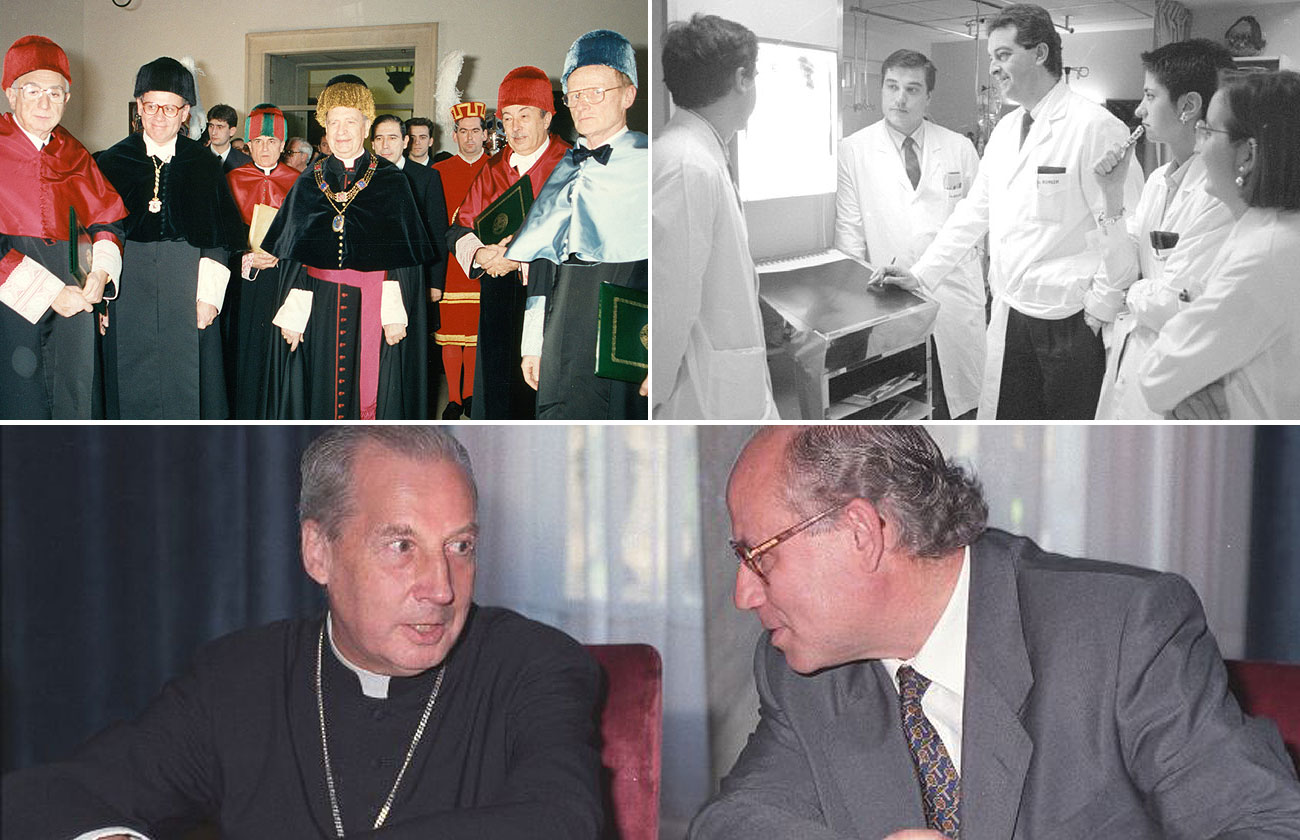His 5 years as President
In the years in which Alejandro Llano was President, a participatory strategic plan was established in all the Centers, there was a great impulse in the construction of buildings and facilities, the first steps were taken to begin a bold program of research that aimed to place the University and its Clinic at the highest level within the biomedical area .
In addition, during his term of office, from agreement with the reform of university degrees and the general guidelines approved by the Ministry of Education and Science, the new four-year programs of study plans began to be implemented.
Thanks to the generous support of the association de Amigos, the construction of several buildings was completed.
-
1991/92 academic year
Alejandro Llano succeeded Professor Alfonso Nieto as President in 1991.
At the first opening of the academic year over which he presided, the Gold Medal of the University was presented to Francisco Ponz, Full Professor of Animal Physiology, third President of the University between 1966 and 1979; to Carmen López, who, as director, was part of the first Nursing management team of the Clínica Universidad de Navarra; and to Amadeo de Fuenmayor, Full Professor of State Ecclesiastical Law, Dean of the School of Canon Law between 1968 and 1987.
That year saw the inauguration of IESE's Law Building and campus in Madrid, as well as the Clinic's new chapel .
Seventy-one students began their studies in Technical Architecture.
But what undoubtedly marked this academic year was the beatification of the University's founder, Josemaría Escrivá. In preparation for this historic and joyful event, in the months leading up to May 17 (the date of the beatification), on the initiative of Office of Student Affairs, the various centers and the Colleges, many round tables, conferences and colloquiums were organized on the figure and teachings of the Founder of Opus Dei. On June 26, the anniversary of the dies natalis of Blessed Josemaria Escriva, an academic ceremony was held in his honor. Profs. Carmen Castillo, Jesús Honorato, Leonardo Polo, Francisco Ponz, Pedro Rodríguez and President Alejandro Llano took part.

-
1992/93 academic year
The University celebrated its 40th anniversary.
In view of the Issue and the magnitude that the various aspects of the University's life have reached, the board of Government decided last year to begin the elaboration of a medium and long term plan reflecting in a global and coordinated manner the forecasts and possible actions in the academic and economic fields, in order to improve the management and achieve the University's goals more effectively. In this sense, the Executive Council held periodic work sessions with the Deans and Directors, in order to achieve a more fluid and effective communication between the various levels of government, while trying to facilitate work as a team, unify criteria and enhance inter-faculty cooperation.
Since the University already had more than 30,000 graduates, the Alumni Association was created to maintain a permanent relationship with them and promote their partnership in the university tasks of providing information and scholarships.
The new plans of programs of study for the degrees in Law, Philosophy, Journalism, Audiovisual Communication (newly implemented), Economics, and Business Administration and Management began to be implemented.

-
1993/94 academic year
Alejandro Llano chaired for the first time, as President, a doctoral graduation ceremony 'honoris causa'. In January 1994, Francesco Cossiga, Rafael Frübeck de Burgos, Robert Spaemann, Manuel Elices, Leo Scheffczyk, Jorge Carreras and Tadeus Styczen received the distinction.
In March, the death of Chancellor, D. Álvaro del Portillo, became the most important event in university life during the 1993-94 academic year.
agreement On April 21, Pope John Paul II confirmed the appointment of Mr. Javier Echevarría as Prelate of Opus Dei, to whom, in accordance with the provisions of the statutes, corresponded the position of Chancellor of the University.
One of the practical measures adopted that year was the implementation of a new action plan for promote and the management of research in the Pamplona Centers. The University of Navarra's research Plan (PIUNA) aimed to significantly increase scientific activity by stimulating the leading role manager of the Departments and promoting programs of study in certain areas considered to be of preferential interest.
In addition, work continued on the reorganization of teaching, agreement with the general guidelines established by the Ministry of Education and Science. In academic year 1993/94, the new programs of study plans began for the degrees in Philology Hispanic, History, Medicine, Pharmacy and Biology; Industrial Engineering, and diploma program in Nursing.

-
1994/95 academic year
In the 1994-95 academic year, the new programs of study plans for the degrees in Humanities, Pedagogy, and advertising and Public Relations began.
The high school mayor Mendaur was inaugurated.
In 1995 the University awarded the Gold Medal to Dr. José Cañadel, director general of the Clínica Universidad de Navarra for 15 years (1969-1984) and its medical director for 5 more years (until 1989); to Professor Félix Álvarez de la Vega, first Dean of the School of Pharmacy; and to Joaquín Casellas, first director of Tecnun, between 1962 and 1978, and Vice President of the campus of San Sebastián. degree scroll The Gold Medal was also awarded that year, posthumously, to Jesús Vázquez, who had joined the University in 1960 and was Dean of the Schools of Science and Medicine, and director of the department of Anatomy Pathology of the Clínica Universidad de Navarra.

-
1995/96 academic year
The 1995-96 academic year saw the start of the new programs of study plans for the bachelor's degrees at Chemistry and Biochemistry .
The Social Sciences Building (today, of the School of Communication) and those that completed the School of Engineering of San Sebastian were inaugurated.
Work also progressed on the fourth phase of the University Clinic, which will be devoted mainly to consultation rooms and was scheduled to begin operating in early 1997.
The construction pace at campus did not stop that year: a building for classrooms and laboratories in the Science area, another one for Library Services of Humanities and social sciences, and the increase of issue of sports courts were underway.

